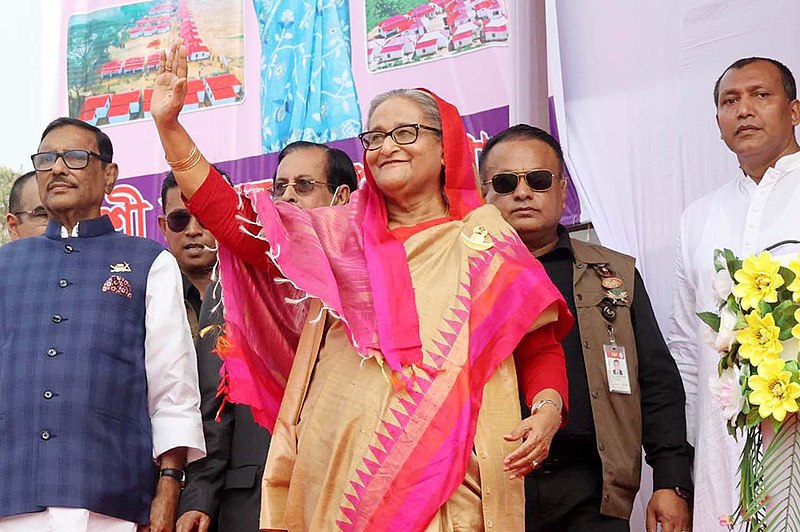Welcome to Factal Forecast, a look at the week’s biggest stories from the editors at Factal.
We publish our forward-looking note each Thursday to help you get a jump-start on the week ahead.
The Factal Forecast podcast will return next week.
Listen now or download on your favorite platform.
Week of Jan. 5-12
A Look Ahead
Jan. 7 – Bangladesh parliamentary elections
Voting opens Sunday in Bangladesh’s parliamentary elections as opposition parties, who have seen many of their leaders jailed amid a reported government crackdown, plan to boycott the poll.
What’s happened so far
Prime Minister Sheikh Hasina, who is seeking a fourth term, called the election ahead of the expiration of parliament’s five-year session at the end of January. All 350 seats in the Jatiya Sangsad are being contested, with 300 of the seats directly chosen by voters. The remaining 50 seats are reserved for women, allocated by proportional representation. With the main opposition parties boycotting the poll, the only candidates running for election are from the ruling Awami League, its allies and a number of independent candidates. Opposition party leaders say they are still being targeted by security forces despite not running in the election.
The impact
With an opposition boycotting the election and thousands of political prisoners jailed, Hasina is expected to return to power with a majority of votes and seats in parliament. Human Rights Watch has called on the government to stop targeting opposition parties and hold free and fair elections.
Jan. 8 – Somalia’s Puntland elects state leader
Parliamentarians in the Puntland region of Somalia will select a new leader on Monday after proposed changes to the state’s electoral system led to violent street clashes between rival troops.
What’s happened so far
In June 2023, Puntland’s current President Said Abdullahi Deni sought to replace the region’s indirect voting system with a direct one, but dropped the measure after deadly fighting broke out between state soldiers and combatants loyal to the opposition. The two sides have since been locked in a back-and-forth over the election date, which culminated in regional security forces surrounding the Puntland parliament in mid-December while lawmakers voted to extend the parliament’s term and use the existing system for Monday’s presidential vote.
The impact
Around a dozen candidates are standing to become president of Puntland, including the incumbent Deni and Somalia’s former foreign minister Abshir Omar Haruse, who resigned from his post to take part in the vote. While Deni reportedly enjoys support from the electoral commission and state institutions, it’s unclear whether he can drum up the same level of support among lawmakers to allow him to serve another term. Given the tensions in the lead-up to the vote, further violence is possible between the rival military factions, particularly if allegations of electoral irregularities emerge.
Factal’s 2023 in Review
Used by nearly 300 humanitarian aid NGOs, an app opened in over 100 countries a week and as “important as our phone system” to our members — Factal’s 2023 was full of innovation and expansion.
Jan. 8 – Lufthansa to resume flights to Tel Aviv
German flag carrier Lufthansa announced it will resume flights to Israel’s Tel Aviv on Monday.
What’s happened so far
Lufthansa suspended its flights to Israel shortly after the Oct. 7, 2023, Hamas-led attacks that left at least 1,200 people dead. Most European and U.S. airlines followed suit and halted flights to Israel, with approximately 50 percent of scheduled flights to Tel Aviv suspended as early as the day after the Palestinian incursion. Many countries likewise issued travel restrictions to Israel that remain in place, including the United States, United Kingdom and Germany.
The impact
The German airline said that it would resume approximately a third of its normal schedule, with four weekly flights from Frankfurt and three others from Munich. Although Israel’s Ben-Gurion Airport has remained open and active in the past few months, many airlines continue to push back their resumption dates for later in 2024. This include British Airways, which has no available flights to Tel Aviv until Feb. 1, and Virgin Atlantic, which, despite saying its schedule was “under constant review,” has canceled its flights to Israel until mid-March. Although long-distance rocket launches from Gaza to central areas of Israel have decreased significantly as the war surpasses 90 days, most airlines remain hesitant to begin flights to Israel in the new year due to the continuing Israeli military offensive in Gaza that has claimed the lives of more than 22,000 people.
Jan. 11 – Turkey, Romania and Bulgaria ink deal on floating Black Sea mines
Officials from Turkey, Romania and Bulgaria are expected to hold a signing ceremony in Istanbul next Thursday as part of a “Trilateral Initiative” to clear Black Sea mines.
What’s happened so far
The three European countries have announced plans to collectively clear mines drifting into their territories in the Black Sea following Russia’s invasion of Ukraine. According to the Turkish defense minister, mines have been placed in both Ukrainian and Russian ports since the start of the war, which can sometimes reach their straits due to the current.
The impact
The move by the three countries aims at protecting the exploration of energy by vessels in the area, after the war caused a crisis in the grain exports with Russian military vessels blocking Ukrainian ports in the Black Sea for several months. It is unclear if more countries are planning to join the initiative for now, but the U.K. said last month it would send two Royal Navy minehunter ships to the Ukrainian Navy to help the country counter the threat of Russian sea mines.
Jan. 11 – Hunter Biden to make initial court appearance on tax charges
U.S. President Joe Biden’s son Hunter will appear in court in Los Angeles on Thursday for the first time in relation to tax charges.
What’s happened so far
Hunter Biden was recently charged with nine tax-related offenses, including three felonies, over his tax fillings. In a release, special counsel David Weiss’ office accused the President’s son of failing to pay at least $1.4 million in self-assessed federal taxes between 2016 and 2019, allegedly spending money on drugs, escorts and luxury items.
The impact
The maximum penalty Biden could face if convicted is 17 years in prison. Biden’s attorney and Democrats have called the overseeing of the prosecution by Weiss, a Donald Trump nominee, as “politically motivated.” The trial comes just months before the next US presidential election, where Joe Biden is up for re-election. The troubles of his son have often been used by his opponents, including Trump, during election campaigns, and this time it is unlikely to be any different.
Jan. 11 – IMF to meet on Pakistan loan program
On Thursday, the International Monetary Fund’s executive board plans to discuss, and most likely approve, the second installment of Pakistan’s $3 billion deal with the organization.
What’s happened so far
Following the initial agreement in July 2023 and the release of around $1.3 billion, Pakistan and the IMF agreed on releasing the second part of the loan, some $700 million, in early January. Pakistan met and surpassed financial expectations set out by both parties in order to secure further chunks of the loan, which was negotiated when Pakistan was close to defaulting on a separate but soon-expiring IMF loan.
The impact
The second part of the IMF’s multi-billion-dollar loan comes at a good time for Pakistan, as inflation is set to rise and economic forecasts showcasing a contraction in the Pakistani economy with a large amount of debt in its books. While it is a good sign that Pakistan is meeting IMF’s conditions, officials have already indicated that it may seek another loan with the IMF to buttress Pakistan’s finances. After the expected approval Thursday by the board, the final payout in 2024 will likely be easier.
What Else Matters

Hamas official killed in Beirut explosion
The deputy leader of Hamas’ political bureau and founding commander of its military wing Saleh al-Arouri was killed in an explosion attributed to an Israeli drone in a southern suburb of Beirut on Tuesday. At least five others, including two other senior Hamas figures, died in the blast, according to Lebanese state media. While Israel has not directly claimed responsibility for the blast, a senior advisor to Israeli President Benjamin Netanyahu described the incident as a “surgical strike against the Hamas leadership” and stressed it was not an attack on Lebanon. U.S. intelligence assessments also supported the allegation that Israel was behind the targeted killing.
Watch for: Protests broke out in Ramallah in the wake of the blast and a general strike was declared across the West Bank on Wednesday. Some reports suggested Hamas was considering withdrawing from talks on a ceasefire in Gaza following al-Arouri’s death, although this remains unconfirmed. Israel was also reportedly preparing for significant retaliatory action from Hezbollah in southern Lebanon, with the Hezbollah leader Hassan Nasrallah vowing in a speech on Wednesday that al-Arouri’s death “won’t pass without punishment.”
Japan earthquake and tsunami
A 7.6 magnitude earthquake struck Japan’s Ishikawa prefecture on Monday, causing at least 73 deaths, hundreds of injuries and widespread destruction of houses and infrastructure, especially in the Noto peninsula. More than 31,000 people have been housed in shelters as emergency teams continue to carry out search and rescue operations for people missing or in distress. More than 30,000 households in the region remain without power, and water services are disrupted in some cities. Public transport networks, including railway services, have resumed operations after some were halted for around 24 hours. Tsunami warnings issued after the quake were lifted on Tuesday.
Watch for: Meteorology officials have warned of unfavorable weather conditions as rescuers try to find those reported missing. Cold temperatures and heavy rainfall could delay the completion of search efforts and the reconstruction of essential services. Nearly 500 aftershocks have been detected since Monday and the possibility of a second high-intensity earthquake remains elevated through the end of the week. At least 2,000 military staff have been mobilized to bring humanitarian relief by air to those areas that remain isolated.
Extended Outlook
What’s on our radar in the coming weeks…
Jan. 5-12
Jan. 7
- Bangladesh parliamentary elections
Jan. 8
- Somalia’s Puntland to choose state’s leader
- Lufthansa to resume flights to Tel Aviv
Jan. 11
- Hunter Biden to make his initial court appearance on tax charges
- Turkey, Romania, Bulgaria to ink deal on floating Black Sea mines
- IMF to meet on Pakistan loan program
Jan. 13-19
Jan. 13
- Taiwan election
- Africa Cup of Nations begins
Jan. 14
- Comoros presidential elections
- Guatemalan presidential transition
Jan. 15
- Iowa caucuses
- North Korea budget meeting
Jan. 19
- Winter Youth Olympics begin in Gangwon, South Korea
Jan. 20-26
Jan. 23
- New Hampshire primary
Jan. 25
- Nepal national assembly elections
Jan. 26
- French president visits New Delhi, India
- Tuvalu elections
Jan. 27-Feb. 2
Jan. 28
- Finnish presidential election
Feb. 1
- EU budget summit
Top photo: Bangladeshi Prime Minister Sheikh Hasina is seeking a fourth term in office during Sunday’s parliamentary elections. (Photo: DelwarHossain / Wikimedia Commons)
Thanks for reading! If you want the Factal Forecast in your inbox, you can sign up for free.
Factal gives companies the facts they need in real time to protect people, avoid disruptions and drive automation when the unexpected happens.
Try Factal for free or talk with our sales team (sales@factal.com) for a demo.

